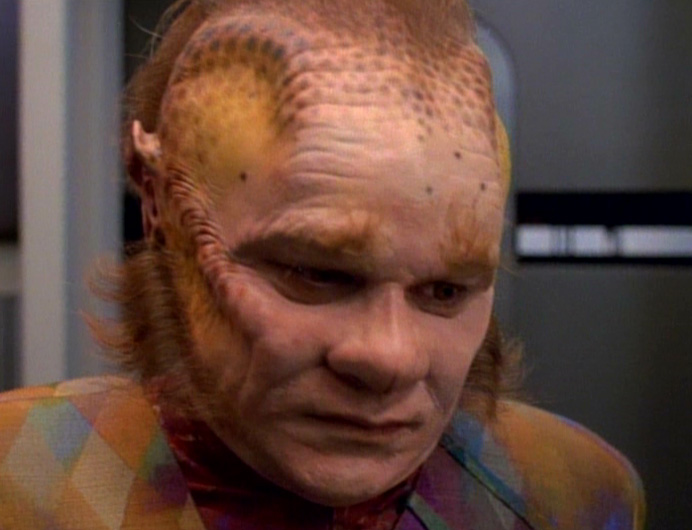Delta Redux: A Voyager Rewatch: Jatrel
On the surface this episode shouldn’t work.
For the second week in a row we have a not-too-subtle allegory this time in the form of atomic weapons; and again, as with Faces, we have an underdeveloped character given a moment to take center stage. Last week it was B’Elanna, this week it’s Neelix.
Now if the idea of putting the – up till now – comic relief character in the position of nuclear holocaust survivor confronting his family’s killer seems like a hard sell you would be absolutely right in thinking this. Neelix has been, for the most part, the silly buffoon whose job it was to make goofy food jokes and get jealous of Kes when she spoke to guys. So the thought of thrusting him into a dramatic lead where he needed to be serious and thoughtful was simply not something I saw coming. Or wanted for that matter.
But somehow it works.
“It is not possible to be a scientist, unless you believe that all the knowledge of the universe and all the power that it bestows is of intrinsic value to everyone. And one must share that knowledge, and allow it to be applied – and then be willing to live with the consequences.” – Dr. Ma’Bor Jetrel
To be honest the cold open when Neelix hears the name of the titular Jetrel then storms off huffing and puffing and doing him angry face of anger was not promising. But as the story progresses Ethan Philips settles in and delivers a surprising range of emotions in a rather subtle performance. To take a character like Neelix (a character if I’m honest has kind of annoyed me all season) from a wacky cook to a credible traumatized post-war survivor is quite a feat. Philips takes the character to some uncomfortable places. He seethes with anger while at the same time is obviously frightened by Jetrel and all the while wracked with guilt for his own perceived cowardice. A remarkably nuanced performance I simply was not expecting.
And Philips never forgets his Neelix-isms so it doesn’t feel jarring when the unexpected depth is added. At one point Neelix does his typical, “Did I ever tell you the story…” shtick which usually leads into a pseudo-funny, braggadocio bit of fluff but this time becomes a heartfelt story about killing and animal in a trap (a poignant and biting analogy as he knows Jatrel can hear him). It is told with his typical inflection and tone so we know this is the same old Neelix; only now he has some teeth.
But the crux of this story is of course the parallel to atomic weapons, specifically the Hiroshima and Nagasaki bombings, with Jetrel as the Oppenheimer stand-in. This is heavy-handed and none-too-subtle but it works in a very old school Star Trek way. Star Trek works best when it is a character-driven morality play. When it takes a “real world” issue and projects it forward giving a metaphoric twist with far-future trappings and has the characters debate the moral and ethical ramifications of that issue. It could be race or sexuality or slavery or, as in this case, weapons of mass destruction. It doesn’t always work but it is always entertaining. And Jatrel works.
The key to this success is the fact that they never paint Jatrel as an outright villain. He is remorseful for what happened but, like Oppenheimer, not that he built the weapon itself. The fact that the military used the weapon to kill hundreds of thousands of people was not what he intended and, although it’s a shame that so many died, the work was needed. In his mind it was necessary for scientific progress – even going so far as to claim that if he didn’t build it someone else would have, again paralleling the creation of the atomic bomb.
Jatrel distances himself and hides under the shield of scientific discovery never taking full responsibility for what happened and at one point even attempts to paint himself as a victim. He similarly seeks to redeem himself by undoing the effects of the weapon under the guise of more scientific discovery but actually it is really just his arrogance that motivates him. It was his arrogance that led him to create the weapon in the first place and it is his arrogance that will eventually lead to his failure. Still he is not a ranting crazy person, arrogant yes, but calm and rational. His weapon did kill masses of people but it did end the war which potentially saved even more lives. This is a tenuous argument to make but still valid.
Unless you’re Neelix and your entire family were vaporized and your planet destroyed. Like I said, tenuous.
But this leads to one of the best scenes I’ve seen so far on Voyager: Neelix forgives Jatrel on his deathbed. This in and of itself is not unique but it is the way Philips plays Neelix that is interesting. When Neelix enters the sick bay with the purpose of telling Jatrel “something” it is never quite clear if he is going to angrily dress down the scientist he spent the entire episode actively despising or if he had something else in mind. In the end, just as the man is dying, Neelix does forgive him and in doing so allows Jatrel to die in some semblance of peace but it is not certain if that is his intent of if he actually means it. It is a remarkable amount of ambiguity for a show that is not exactly known for such things.
This is by no means a perfect episode. There is a rather unfortunate and tired dream sequence where Neelix is confronted with his enemy and it is in fact himself! Yawn. And, while incredibly well played, a scene where Neelix explains his anger at Jetrel to Kes who explains in turn that it is himself who he is really angry with. Not, you know, the guy responsible for countless, horrific deaths including his own family. She does mean well I suppose.
But overall Jatrel is a really well done episode, one that is thoughtful and thought provoking. Basically it does what Star Trek does when it is at its best, it makes you think.












Likhon chowdhury says:
Conor says:
Andy Garcia says: